Our Graduate Students
Our Graduate Programs are small and select. We take in eight to ten MA students per year, and about two to three new doctoral students. There are thus up to thirty current graduate students with workspace in the Department in a given year.
Students are attracted to our graduate programs by the research and teaching strength of our faculty, as well as the intimacy and collegiality of the department. They know that, at Dalhousie, they will be able to take the seminars they want, have personal, supportive relationships with their colleagues and advisors, and develop and pursue in depth their own scholarly interests.
Recent M.A. and Ph.D. students have come to us from universities across Canada, including the universities of Victoria, Toronto, Ottawa, Saskatchewan, and Manitoba as well as Queen’s, McGill, and Concordia; others have come from programs in the United States, the United Kingdom, Serbia and India.
Aisha Rahman Asha

Aisha Rahman Asha is a PhD student at English Department, Dalhousie University, Canada. She is also a faculty member at English Discipline, Khulna University, Bangladesh with a modest five-year teaching career and is currently on study leave. Her true specialty is South Asian literature but she also teaches Literary Theory, Victorian poetry, and Twentieth Century English Drama.
Ashley Anderson
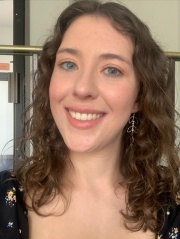
Ashley Anderson (she/her) is an MA student in the Department of English at Dalhousie. Her research interests include Literary Theory and Criticism, Eighteenth and Nineteenth-Century Literature, Gender Studies, Children’s Literature, and Postcolonial Literature. Her Undergraduate thesis utilized theories of gazing and assemblage to explore the inherent connection between identity, performance and observation. She intends to continue examining the performative nature of gender and happiness as well as the commodification of women’s identities and bodies. Ashley holds an Honours BA in English and a Bachelor of Education from the University of Calgary.
Benjamin Bush Anderson
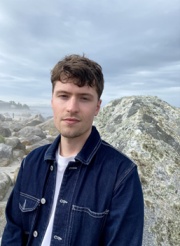
Benjamin Bush Anderson is a poet and novelist born in Mi’kma’ki/Nova Scotia. In 2019 he won the Gabriel Safdie Award for Poetry and was shortlisted for the Vallum Poetry Award in 2022. His writing is featured or forthcoming in Second Factory, The Antigonish Review, FENCE, and elsewhere. In 2023, Benjamin graduated with Great Distinction from Concordia University's Honours in English & Creative Writing program. His research and writing—funded by the Canada Council for the Arts and SSHRC—centers Maritime dialects, ecological co-authorship, and visual poetry. He is currently at work on a collection of poems and on a novel while pursuing an MA in the Department of English at Dalhousie University.
Cassidy Serhienko

Cassidy Serhienko is a PhD student interested in medieval literature, fantasy adaptation, contemporary popular fiction, and digital humanities. Her current research explores identity in YA fantasy adaptations of Arthurian romances. She comes to Dalhousie with a B.Ed. and B.A. Honours in English from the University of Saskatchewan, and an MSc in Digital Humanities and MSt in Medieval Studies from the University of Oxford, where she studied as a Rhodes Scholar. Her Master’s work explored the impact of BookTok on publishing trends in the romantasy genre, and the influence of women characters on the code of chivalry in later Arthurian romance.
Cher Hann

Cher Hann (they/them) is a PhD candidate in English, who specializes in pop culture studies. Their Vanier CGS funded research explores the symbolic/political function of talking infants in Hollywood media. Beyond their thesis work, Cher is passionate about video game analysis, and (more personally) deepening their ties to local queer community through the collaborative creation of music, comedy and art.
Daryl Bruce

Daryl Bruce (he/him) is a Special Provost Alumni PhD student studying postcolonial queer literature. His work seeks to interrogate how heteronormativity has influenced queer creative output as it infringes on facets of queer life that are now, within contemporary Western culture, deemed abnormal, deviant even, and are no longer part of the “appropriate” discourse pertaining to queer experience. A graduate of Concordia University’s MA in Creative Writing, he is an Ontario Arts Council funded writer and poet with his creative work having appeared in The New Quarterly, PRISM, The Antigonish Review among others.
Ella Ratz
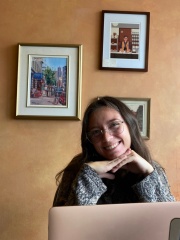
Ella Ratz (she/her) is a PhD Candidate in the field of Canadian Literature. Her SSHRC-funded dissertation project investigates the ways in which urban space is imagined within 21st-century feminist poetry in English Canada. Ella comes to Dalhousie with a BA from the University of New Brunswick and an English & Cultural Studies MA from McMaster University.
Emily Cann
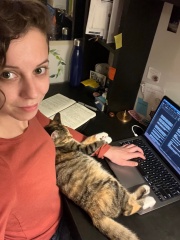
Emily (she/her) is a PhD student interested in intersections of medicine and literature. Her Killam-funded doctoral research will focus on representations of various modes of recovery in contemporary fiction and memoir. Originally from Epekwitk/PEI, Emily comes to Dal via an MFA in Creative Writing from UBC (2022), an MS in Narrative Medicine from Columbia University (2019), and an MA in English from the University of Guelph (2018). She completed her BA in English & Biology at Acadia in 2017.
Emily's poetry and fiction have appeared in various publications, including FreeFall, yolk, and carte-blanche. Her creative nonfiction was long-listed for The New Quarterly's 2023 Edna Staebler personal essay contest. She also serves as the Poetry Reviews Editor for the Artisanal Writer. Emily lives with her partner, Simon, and her cat, Chloe—both of whom try to be supportive of how much time she spends at her desk.
Gavin Foster
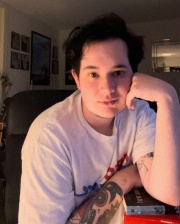
Gavin Foster (he/him) is a Killam and SSHRC funded PhD candidate studying medieval literature. His research interests include Old and Middle English translation/adaptation, Tolkien, and queer theory. His dissertation aims to trace trajectories of grief through the experiences of female characters in Old English elegiac poetry, Sir Thomas Malory’s Morte Darthur, and J.R.R. Tolkien’s The Lord of the Rings. He has presented at many conferences including the International Medieval Congress (IMC) and the International Congress on Medieval Studies (ICMS), and his research has been published in the Journal of Tolkien Research.
When not researching, he writes poetry, often focusing on intersections of personhood, place, and pop culture. He is currently working on his first manuscript, publishing bits and pieces in the meantime. You can read his poetry in Open Heart Forgery, the tide rises, and The Dalhousie Review (forthcoming).
Helen Pinsent
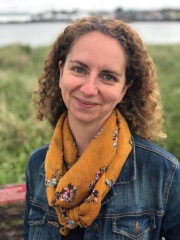
Helen Pinsent is a PhD candidate at Dalhousie, focusing on American gothic literature and popular culture with the support of a Killam Doctoral Award and a Doctoral Fellowship from the Social Sciences and Humanities Research Council of Canada. Her research interests include monster studies and mobility studies, and she is especially fascinated by the many ways the two fields overlap. She has recently presented work on Jack Kerouac, Shirley Jackson, Stephen King, and Lovecraft Country, and her dissertation is tentatively titled “Automonstrosity: Automobility and the American Dream in Post-War American Gothic.”
Jessie Cubilla

Jessie Cubilla (she/her) is a Filipina Canadian MA student with research interests in postcolonial and diaspora studies, queer and trans studies, and affect theory. An awardee of the SSHRC CGS-M scholarship, she is wrapping up a thesis on the uses of shame in contemporary Filipino American poetry. She has a BA in English Rhetoric, Media and Professional Communication along with a specialization in Creative Writing from the University of Waterloo. Outside of research, Jessie also writes poetry, with work published in Textile and forthcoming in Echolocation and Gently Mad Magazine. She is probably drinking a Red Bull and thinking about how big the ocean is right now.
Isabella Lirette
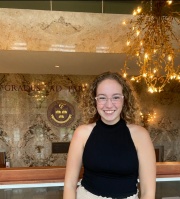
Isabella Lirette (she/her) is a Special Provost Alumni PhD student interested in Eco-criticism and Indigenous futurism. Her SSHRC and Dalhousie Research Excellence Scholarship-funded doctoral work will focus on an eco-critical analysis of Indigenous climate fiction. Isabella’s MA thesis from Dalhousie traced the temporal elements of Michael Christie's Greenwood, with specific attention paid to his use of “tree-time.” She has a BA in English from Mount Allison University and a Bachelor of Education from the University of New Brunswick.
Johanna Gibson
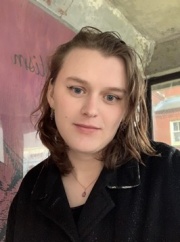
Johanna Gibson (she/they) is an English MA student with an academic focus on queerness and disability in science fiction stories. She is also a recent BA Honours graduate from Dalhousie. Johanna is a singer, songwriter and poet who has been writing and performing in Halifax since 2020. Her work leans into a simplistic, DIY folk and punk ethos. Prior to moving here, they lived in Ottawa, Montreal, and Glasgow, Scotland. You can usually find Johanna dressed head-to-toe in purple in a constant rotation of Halifax cafes and pizza joints. Come say hi!
Julia Palmer
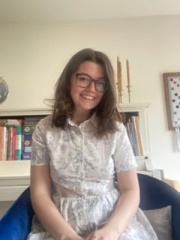
Julia Palmer (she/her) is a first-year MA student in the Department of English at Dalhousie. She received her BA in English from Mount Allison University in 2021 with a focus on Early Modern literature, literature by women, and comics studies. At Mount Allison, Julia had the pleasure of working with the student-run Atlantic Journal of International Studies (ATLIS) and the creative student journal, 7 Mondays. Originally from Fredericton, New Brunswick, Julia loves movies, cartooning, and her two dogs, Poppy and Daisy.
Lindsay Church

Lindsay Church (She/Her) is a SSHRC-funded, Special Provost Alumni PhD candidate studying medieval literature. Her PhD project explores the way that modern fantasy adaptations of the Arthurian mythos ‘write back’ to idea of who gets to be legendary in medieval Arthuriana (particularly Malory’s Morte Darthur). Alongside King Arthur, medieval literature more broadly, and fantasy literature, her research interests include representations of girlhood, the apocalypse, and monsters. She has presented at numerous conferences and has published in Americana (forthcoming). In her spare time, she writes fantasy fiction and bothers her cat.
Magdalina El-Masry
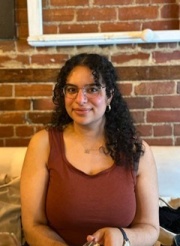
Magdalina El-Masry (she/her) is a PhD student in the Department of English at Dalhousie University, with a focus on adaptation in 20th-century American literature and film. Originally from Montreal, Quebec, she completed her MA in Film and Moving Image Studies at Concordia University with a thesis titled “The Act of Suffering: Intense Performances in Contemporary American Cinema.” She has been an executive member of the Society of Film and Media Studies Performance and Stardom Scholarly Interest Group since 2022. Her work appears in Cinephile, Film Quarterly, and The International Review of Scottish Studies
Marissa Carroll

Marissa Carroll (she/her) is a PhD student interested in place, poetics, and periodicals. With the support of a Killam Doctoral Award and a SSHRC Doctoral Fellowship, her research maps and examines literary constructions of Atlantic Canadian regional identity in Canadian small press poetry. Her work combines literary-critical, bibliographical, and historical perspectives and methodologies. She turns to Dalhousie University's extensive "Canadian Small Press Collection" to map diverse and shifting fields of poetic production over the latter half of the twentieth century. Marissa is a Nova Scotia Graduate Scholar and a Provost-Alumni Special Scholar. Her MA thesis from Dalhousie traced the circulatory poetics of The Song Fisherman’s Song Sheet, a periodical printed in Halifax, NS in the late 1920's. She has an Honours BSc in biology with a minor in English from the University of Ottawa and has planted trees in Nova Scotia for many summers.
Michael Cameron

Michael Cameron studies “extinction narratives” of all sorts – apocalypse and apocalyptic literature (both secular and biblical); human extinction in science fiction; nineteenth-century evolutionary theory, particularly its emphasis on species extinction and its influence on Romanticism and Victorian literature; and depictions of endangered species and species extinction in popular science. His doctoral project, tentatively titled “The Last (Hu)Man from the Age of Revolution to the End of History,” explores the figure of the “Last Man” in literature and political theory from three interpretive axes: Last Man qua “endling” or the solitary final member of the human species; Last Man qua “New Adam” or the last fertile human male charged with the procreative task of restarting the human race; and Last Man qua Nietzschean “old age of mankind” or human civilization on the decline. Cameron has been awarded two Joseph Armand Bombardier Canadian Graduate Scholarships, one Master’s and one Doctoral. His work has been published in Romanticism, and his first monograph, The Last Man and Gothic Sympathy, was published by Cambridge University Press in February 2024. "
Morgan Kittson
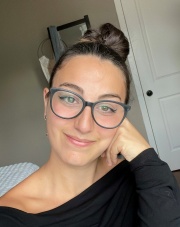
Morgan Kittson is an MA student in Dalhousie’s Department of English. She completed a Bachelor of Arts in Honours English and Creative Writing from Concordia University. At Concordia, Morgan developed a keen interest in editing and served as editor-in-chief of creative and academic journals alike. Morgan holds a Dr. Malcolm Ross Graduate Scholarship. Having developed a fascination for literary moments in which bodies come into contact with culture, Morgan will pursue this interest in her thesis. She intends to examine how gender and subjecthood is formed and performed in twenty-first century coming-of-age novels. More broadly, her research interests include postcolonial literature, body-culture studies, and food studies.
Naomi Boswell

Naomi Boswell (she/her) is a master’s student who is passionate about the value and power of education. She completed her undergraduate studies in English Literature and Anthropology at the University of Cape Town in South Africa. Her primary research interests lie in the Oceanic Humanities and Archival Theory, and she has written on topics in the emerging global south theory of water as an archival space. She is particularly interested in literatures situated on “black shorelines,” and how writers in the African diaspora negotiate relationships and histories alongside, within, and atop the ocean. Rather appropriately, her favourite Victorian-era poem is Tennyson’s “Ulysses".
Serafina Piasentin
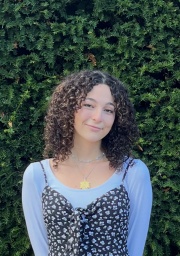
Serafina Piasentin (she/her) is an MA student in the Department of English at Dalhousie. Her research interests include the pursuit of Paradise in literature, particularly in medieval texts, as well as the vertex of philosophy, history, and art that reveals larger truths about the metaphysics of life. She is prone to writing historical fiction and travel poetry. Before Dalhousie, Serafina graduated at the top of her class in English Literature and Creative Writing from the University of Windsor with study abroad credits from Keele University and the University of Edinburgh in the UK. While in Scotland, she co-founded a literary journal called The Gently Mad Magazine which publishes art, poetry, and short stories for sanity’s sake. She has also been published in the poetry collection, Where The Map Begins, as well as in other anthologies throughout Canada and the UK. She has experience as a publisher, poetry editor, teacher, and currently works as a freelance journalist for Windsor Life. Serafina is passionate about traveling, having visited over 50 countries. She looks forward to moving to Canada’s East Coast, where she has yet to lay foot.
Shannon Brown

Shannon Brown (she/they) is a Special Provost Alumni PhD student studying queer Canadian literature. Their work explores how queer Canadian subjects harness fiction as a tool to challenge national hegemonic priorities and gaze toward unusual potentialities of purpose and connection in our shared spaces. This research is especially concerned with representations of care, kinship, and queer temporalities. Shannon has published various critical works and flash fiction pieces with the UofA’s Crossings Journal, Circe Magazine, and The CrW’s Anthology, Sighting Stories. They’ve also presented work at the 2022 UofA Women’s & Gender Studies Conference. Shannon left behind Alberta’s prairies, mountains, folk music scene, and their position at a zero-waste refillery shop to live a little life out by the coast.
Shannon Payne

Shannon Payne is a Killam and SSHRC funded scholar. Her MA thesis focused on ecocritical readings of Guillermo del Toro films (specifically Pacific Rim, Crimson Peak, and The Shape of Water). Building on that work, her PhD dissertation, titled “It’s Not Game Over,” examines the unique capabilities of video games to respond to the climate crisis. Shannon has presented work at the IGA, and as part of the Green College Resident Members’ Series at the University of British Columbia. In addition to her academic work, Shannon has published several pieces of short fiction and she likes to unwind by running Dungeons and Dragons games for her friends.
Zoe Lambrinakos-Raymond
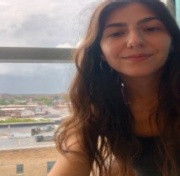
Zoe's current research interests focus on fields of literature and visual art, specifically poetry and collage in the 20th century modernist period. Her SSHRC-funded doctoral research will examine the relationship between what she posit to be modernist poet-collage artist duos who, while one is more involved in the writing of poetry and the other in the creation of collage, maintain longstanding and intimate relationships wherein the poet’s art and the collagist’s art converge, coalesce, and ultimately inform each artists’ respective practice and output, be it literary or visual. A second point of interest in her research will be individual poets well-established in poetry and poetic discourse, and who also spend a significant portion of their artistic careers practicing collage.
Zoe's research focuses primarily on artists from the transatlantic modernist period, addressing the ways in which poetry and collage engage with, borrow from, and ultimately converge with one another, despite contemporary beliefs that they belong to separate media.
Zoe received a BA with majors in Western Society & Culture and Creative Writing and an MA in Creative Writing from Concordia University. While pursuing her studies at Dalhousie University, she continued her literary and visual arts practices, focusing on experimental prose fiction, poetry, and collage.
